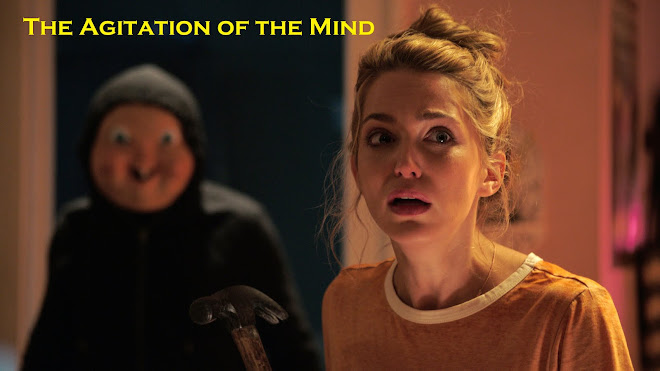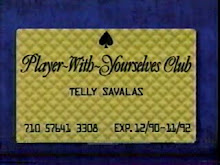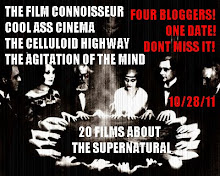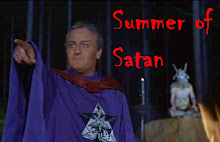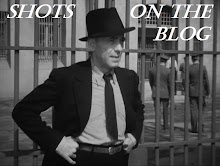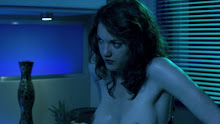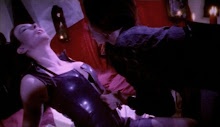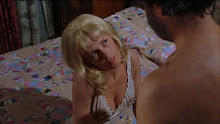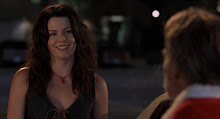Friday, December 23, 2016
WINTER OF DISCONTENT: Threads
Spoilers throughout. In the increasingly urgent series of public information broadcasts made by an ineffectual government as global events escalate towards nuclear war, the exhortation “stay at home” – backed up with threats that unoccupied houses will be seized by the government and rehousing refused to those moving elsewhere in the country – becomes a mantra of sorts. This is the key to ‘Threads’, Mick Jackson’s unforgettable TV movie on the horrors of nuclear war. Its first half focuses specifically on the domestic, with the momentous political events relayed through newspaper headlines and news bulletins. Barry Hines’s script sketches in a complex global scenario with astounding economy; other writers would have fashioned an entire feature from the material and not even given a thought to the ordinary folk whose lives are about to be devastated.
The second half savagely eradicates the concept of home as a safe place – a working class family perish because their fallout shelter is adequate; a middle class family survive longer because their house has a basement. Not that this prevents them from being murdered by looters. Later, a crowd gather outside the gated premises being used to store foodstuffs and demand entry; the leader of a team of armed guards advises them to go back to their homes; less than a minute later, he’s directing his men to fire tear gas at them. Later still, as society unravels – the title refers to the ties that both join together a society and leave it vulnerable to attack – a group of refugees plodding across a bleak landscape are strafed by a low-flying light aircraft from which an amplified voice barks at them to go home. Raised fingers and clenched fists are offered to the plane by way of response.
The concept of home infuses ‘Threads’ from the outset. Its nominal protagonists are Jimmy Kemp (Reece Dinsdale) and Ruth Beckett (Karen Meagher), whose respective parents – David Brierly and Rita May, and Henry Moxon and June Broughton – aren’t too impressed to learn of Ruth’s pregnancy and the couple’s intent to marry. Objections are strongest on the Beckett side as Mr and Mrs B are middle class and hoped for better for their only child than jack-the-lad joiner Jimmy. Parental disapproval, awkward in-law introductions, and Jimmy and Ruth’s attempt to make a home out of a dismal flat occupies the first 40 minutes or so of the film. Gradually, though, the various characters become aware of how serious things are becoming on the world stage. Jimmy admonishes a bartender for turning off a particularly portentous news update. Ruth suddenly bursts into tears whilst decorating the flat. Jimmy’s father does his best to improvise a bomb shelter from a mattress, a kitchen door removed from its hinges and a pile of rammel stacked on top of it, all the time fretting that he didn’t pay enough attention to the ‘Protect and Survive’ broadcasts.
Meanwhile, powers are devolved to local councils in the event of the worst case scenario. Sheffield (the city was still a major manufacturing hub when ‘Threads’ was made) city council supremo Clive Sutton (Harry Beety) packs his wife off to a safe haven – which turns out to be not so safe at all – and installs an emergency operations team in the city hall basement. Contingencies for post-nuclear survival and societal regeneration are the order of the day, but before any real progress can be made, tensions in the US, Russia and Iran collide and the opening salvos are fired in a conflict that escalates within hours to nuclear deployment.
Jackson’s portrayal of the effects on an everyday social grouping is devastating. The citizenry go from panic buying (a brief but effective scene has the manager of a small supermarket unrepentantly hike the prices of tinned goods) to outright panic. When the first strike hits, the initial response is disbelief. Shoppers stop dead in their tracks. A fireball hangs like something obscene between two civic buildings. “Jesus Christ, they’ve done it,” Jimmy gasps; “they’ve done it!” Two scatological moments capture the awful indignity of facing the unthinkable: a shopper in Sheffield town centre gazes wide-eyed at the horizon, barely aware that she’s pissing herself; Jimmy’s father blurts “Bloody hell!” as he hoists his trousers and stumbles out of the toilet.
I said earlier that Jimmy and Ruth were nominal protagonists. Jimmy definitely so as he exits the narrative at this point, caught in a desperate race to get back to Ruth. It’s the only moment in the film that’s even remotely melodramatic and it’s probable that Hines and Jackson included it to rob the audience of any semblance of a comfort zone. Jimmy has already been revealed as fundamentally less than a romantic hero (his best mate persuades him to be his wingman when a couple of girls in a pub give them the eye; Jimmy ends up shagging one of them in his car); now he’s written out of the narrative entirely, and shortly afterwards, Ruth leaves the confines of her parents’ basement; and after that all bets are off.
Ruth’s surreal progress (if that’s not too proactive a word) through a destroyed Sheffield and – eventually – further north is contrasted with the degeneration of Sutton’s command centre. He and his team are trapped underground after city hall is reduced to rubble. Supplies run low. Tensions increase. Tempers fray. The entombed basement becomes a microcosm of government as a whole, and to call Sutton and his councillors woefully unprepared is an understatement on an entirely new scale. Arrogance and entitlement ooze to the forefront: support services are refused to those “who are going to die anyway”, yet the councillors scream down the phone that rescue teams are too slow in assisting them.
Moral ugliness plays off against visceral ugliness. One of the looters responsible for the death of Ruth’s parents is gunned down. Militia – many of them minor officials with no military training or experience – are armed and given ad hoc powers of life and death. “We’re going to get shot by a traffic warden,” a protestor muses bitterly at one point. Hospitals, deprived of electricity and essential supplies, revert to nightmarish Victorian asylums, full of screaming patients, botched surgeries, blood splashes over the walls and viscera underfoot. But even this vision of healthcare is a comfort compared to the circumstances in which Ruth finally gives birth: in a filthy outhouse in an abandoned freeholding, a chained up and possibly rabid dog snarling and straining at its chain outside.
Money is replaced as a currency by food, which the government partitions out as a reward to “workers” (those fit enough for basic agricultural tasks) or withholds from the elderly or non-able-bodied as punishment for what is perceived as their social uselessness. Those at death’s door doss down in cemeteries. A pack of cigarettes is traded for a bottle of whisky. Insensation or death are the two best options.
As time passes and small semblances of social cohesion emerge – coal mining is resumed; there is some basic provision of electric – one senses that it’s too late: people have become feral; language has devolved; the threads that connect people are few and far between. The coda has Ruth’s daughter giving birth to her own child – a product of rape – only to be handed a stillborn bloody mess in a bundle of dirty rags. The film ends on a freeze-frame of her horror-struck face. She isn’t even allowed a howl of despair.
It’s grim. But we all knew that, right? ‘Threads’ has a reputation for sheer existential awfulness that makes Bergman’s trilogy on faith looked like a gag reel; that makes ‘The Night Porter’ look like ‘The Producers’; that makes Tarkovsky at his bleakest look like ‘The Wizard of Oz’. ‘Threads’ is grim, disturbing; brutal in its commitment to documentary realism. It even takes away from you the ability to comfortingly remind yourself that it’s just fiction. The clipped tones of the narrator are like a BBC newsreader giving you an update on the worst possible news report. The statistics and sociological facts that occasionally punctuate the narrative, tapped out onscreen like a telegraph, emphasize the documentary style. Thirty-two years on from traumatizing the seven million British TV viewers who constituted its original audience, ‘Threads’ has lost none of its power. Sure, the fashions and cultural touchstones may have changed, but it never feels like a time-capsule. Quite the opposite: it feels like a series of dispatches from the not-too-distant future.
Tuesday, December 20, 2016
WINTER OF DISCONTENT: Big Bad Mama II
If Steve Carver’s ‘Big Bad Mama’ is an example of anti-narrative, semi-narrative or shit-we’d-better-pay-lip-service-to-narrative (depending on how eleventh hour the deadline and how frenetic the scriptwriter’s typing skills), then by comparison Jim Wynorski’s ‘Big Bad Mama II’ demonstrates the single-minded narrative focus, uncluttered by subplot, of Akira Kurosawa’s ‘Seven Samurai’.
The story, in all its streamlined glory, is thus: Wilma McClatchie (Angie Dickinson) and her husband Aaron (John Dresden) are working a dirt farm and raising their already very comely daughters, Billie Jean (Danielle Brisebois) and Polly (Julie McCullough), when –
But but but but but …
Wait a minute. Let me finish.
But in the first film –
Dagnabbit, boy, I said quit talkin’ and let me finish this here plot synopsis.
[sullen mumbling]
– when the sheriff and his boys, in the service of landowner and gubernatorial campaigner Morgan Crawford (Bruce Glover) come calling. Aaron doesn’t take too kindly to the foreclosure on the farm and in the ensuing gunplay he’s fatally wounded. Wilma swears revenge. Deciding that death is too good for Crawford, she decides to deep-six his political aspirations by kidnapping his son Jordan (Jeff Yagher) and using journalist Daryl Pearson (Robert Culp) to portray the lad as a willing participant in the McClatchie family’s fast-livin’, tyre-screechin’, tommy-gun-firin’ way of life. Smitten with Polly, Jordan is more than happy to go along with it.
That’s pretty much everything that happens in the 84-minute running time. To go into any more detail would be to give away a little too much about the siege that ends the film (and which includes a magnificently cheeky steal from ‘Foreign Correspondent’).
All right, then: get it off your chest.
But but but but but … in the first film Wilma ain’t got no husband, least not one that appears in the goshdarn movie, and she gets into a life of crime because of a bootlegger who’s kind of an uncle to her girls and one of them girls was a brunette in the first film and at the end it’s heavily implied that Wilma gets –
Whoa there! Keep it spoiler-free, boy.
But ain’t you gonna question them continuity errors, Mr Agitation, you bein’ the big-shot movie critic ‘n’ all? Or are you gonna let it slide on account of the fast cars, shoot-outs and boobies?
Boy, you know me well.
But now that the elephant has been revealed to the occupants of the room, let’s address the issue. ‘Big Bad Mama II’, made thirteen years after the original, exists in the same fictive space as the original due to the same actress playing the same protagonist, the dustbowl/depression era/setting being replicated, and Wilma having two daughters called Billie-Jean and Polly (even though Billie-Jean’s name is spelled differently in the credits to the Wynorski film: she’s Billy-Jean is Carver’s). But is it a sequel, prequel, reboot or the entirely original work of an auteur who only put up with the ‘II’ in the title because the producer insisted on it?
Well, it certainly acknowledges the original: carefully chosen clips from Carver’s film (i.e. not featuring Susan Sennet or Robbie Lee) are included in a mid-film montage sequence that depicts Wilma’s escalating crime spree. But it can’t be a prequel because Billie-Jean and Polly are depicted as, if anything, a year or two older than they were in the first film (speaking of which, Brisebois here plays the older sister to McCullough despite McCullough being four years her senior). And it can’t be a sequel since there isn’t a damned thing that makes sense continuity-wise if it is. And it’s a strange kind of reboot that hitches its wagon so explicitly to the original, right down to casting the same lead.
Whichever way you look at it, ‘Big Bad Mama II’ is odd. I mean, what in tarnation do you call a film that exists in the same fictive space as the original, needs a slightly different timeline in order to justify itself, and yet comes across in the final analysis as basically the edited highlights of its predecessor – a cinematic “greatest hits” package that requires the audience to do nothing more than stump up their hard-earned, put their brain in neutral and keep their mouths shut? What do you call a film like that?
Oh, yes – ‘The Force Awakens’.
So there you have it. ‘Big Bad Mama II’ is ‘The Force Awakens’ but with tommy guns and boobies and a notable absence of spaceships.
Friday, December 16, 2016
WINTER OF DISCONTENT: The Phantom of the Opera
Hello again, kiddies. Welcome back to Uncle Neil’s movie club. Now, can anyone tell me the name of Gaston Leroux’s most famous novel?
That’s right, Timmy, it is ‘The Phantom of the Opera’. And does anybody know what the best film version is?
Very good, Cindy, it is the Lon Chaney film directed by Rupert Julian. But that’s not the version we’ll be watching tonight. Guess which version we will be watching, kiddies.
You got it, little Jimmy! The Dario Argento one … What’s that, little Jimmy? Isn’t it time Uncle Neil handed himself in at the police station? Quite possibly, kiddo, quite possibly.
Where do I start with ‘The Phantom of the Opera’? Do I ask Signor Argento to make himself comfortable on the couch and tell me all about his compulsion to alternately fetishize and terrorize his daughter? Do I rigorously question the reimagining of Leroux’s deformed and masked Phantom as a long-haired wannabe rock god in leather trousers without so much as a zit to blemish his face? Do I poke holes in the backstory which has the infant Phantom cast into a stormdrain in a moses basket and subsequent raised by rats in the Parisian sewers? Do I enquire of Argento and co-scriptwriter Gerard Brach whether they’ve even heard of Gaston Leroux, let alone read the book?
Do I talk about the bad acting? Asia Argento, as Christine Daaé, is terrible – particularly when lip synching (or rather, lip mis-timing) to various opera recordings. Julian Sands, as the Phantom, is terrible – the script wants him to project various combinations of moody, sexy, dangerous, tortured, violent and stud muffin at random intervals, and he responds instead with Charles Hawtry playing Jim Morrison by way of a Dirk Bogarde impersonation. Andre de Stefano as Raoul is terrible – he actually makes Charles Hawtry doing a Dirk Bogarde impersonation seem macho. His excruciatingly fey performance reaches its nadir when Raoul’s brother, trying to cure him of his lovesick moonings, drags him to a bathhouse for the worst orgy in the history of cinema, provoking Raoul to an emotional meltdown compared to which a petulant infant’s toy/pram redistribution scenario resembles a masterclass in Strindbergian drama.
Or do I talk about the stable of grotesques with whom Argento populates the film – the opera house’s oleaginous new manager, installed in said position by friends in high places (a fact that is made much of for one protracted scene and then never revisited); the paedophile plying young ballerinas with Swiss chocolate; the corpulent diva whom Christine eventually replaces, but only after she’s been the butt of every fat joke the film manages to throw out in the meantime; the idiot stagehand who goes hunting the catacombs with his girlfriend for the Phantom’s treasure, the pair of them gurning and spouting stilted dialogue as if intent on sweeping the board at the Razzies; or the ratcatcher.
Yes, let’s talk about the ratcatcher. Let’s talk about his demented persona, a sort of compound Igor, Quasimodo and Wurzel Gummidge. Let’s talk about the ride-on ratcatching machine he invents, a combination vacuum cleaner/golf cart designed by someone with a priapic fixation on Stephenson’s Rocket, in Seventeen-fucking-Seventy. A contraption that it would have killed a little something in me, my dad being a mechanic and all, to take a screengrab of. So I’ll give you this screengrab instead and leave you to speculate as to the precise nature of the relationship between the ratcatcher and his dwarf assistant.
And let’s also talk about how nothing in the film makes sense. How an opera house the size of the palace of Versaille can be built over a series of catacombs which lead downwards to an underground lake – and not actually be affected by the slightest bit of subsidence let alone collapse into the fucking lake. How the Phantom brings a chandelier down by hammering on a load-bearing column instead of, I don’t know, just unscrewing the fittings. How a bunch of rats can save a child from being drowned, bring it up to speak English, play the organ, communicate telepathically and be extremely confident in the seduction/kidnapping of women, and yet do absolutely fucking nothing when the militia come stomping down to the Phantom’s lair, guns cocked and ready to rock. Seriously, this is the director who gave us a swarm of rats massacring a cat-killing cripple in ‘Inferno’; why the hell was the-Phantom’s-army-of-rats-vs-militia not even an option?
And let’s talk about how the narrative simply lurches from one disconnected set piece to another. Granted, illogic and anti-narrative are Argento’s stock-in-trade, but where they contributed to the nightmarish weirdness of ‘Suspiria’ and ‘Tenebrae’, here the effect is a sense of bad writing and lazy direction.
I still haven’t seen everything Argento has made: the TV movie ‘Do You Like Hitchcock’ and his recent ‘Dracula 3D’ have yet to grace the Agitation screening room; but it’s hard to imagine anything worse than this on his filmography. Even a three-hour static shot of his big toe scored to a dentist’s drill would have something more to offer the cineaste, the trash fan and the generally comatose alike.
Saturday, December 10, 2016
WINTER OF DISCONTENT: The Book of Revelation
Ana Kokkinos’s second directorial outing is an honourable attempt to do justice to a Rupert Thomson novel. Thomson is one of Britain’s most inscrutable yet intellectually fascinating novelists. He never repeats himself; does something different with every book. Challenges expectations. In one novel, he tells half of one story, hands over to a different narrator for the last 150 pages and cavalierly leaves the whole thing unfinished. His prose is so perfectly turned, every sentence a masterpiece in miniature, that he makes Paul Auster look like he rushes it. Little wonder that it’s often four or five years between new Thomson titles.
Little wonder, too, that there’s only ever been one adaptation of his work. (Though I’d love to see what Ben Wheatley take on ‘Divided Kingdom’ or Martin McDonagh square up to ‘Soft’.)
Kokkinos relocates ‘The Book of Revelation’ from Amsterdam to Melbourne (I’d guess for budgetary reasons, Kokkinos being based there) and the film automatically loses a something, the dark sensuality of Thomson’s descriptions of Amsterdam unmatched by any visual conjuration of Amsterdam that Kokkinos can manage. Nor does the scene in which the protagonist is kidnapped by a triumvirate of masked and caped women come across as the surreal and disturbing set-piece of the novel. Here, it actually seems quite silly.
And here we find ourselves with an opportune moment to take a stroll through Plot Synopsis Plaza. Take my hand, gentle reader, let’s stroll through the sun-dappled streets and talk about kidnapping, sexual molestation, dildos and the undecidedly improper use of a screwdriver. Let’s talk about PTSD, the loss of the self and the desperate search for meaning. Let’s talk about Daniel (Tom Long), a narcissistic dancer who, with brittle girlfriend Bridget (Anna Torv), is appearing in a ballet choreographed by demanding perfectionist Isabel (Greta Scacchi). During a break in the final rehearsals – opening night is that same evening – Daniel goes out to get a pack of cigarettes for Bridget, an errand she sends him on to get him out of the way of another dancer, and doesn’t return. Isabel asks her ex-husband Olsen (Colin Friels), a cop who specialises in investigating sex crimes, to make some off-the-record enquiries. Twelve days later, Daniel resurfaces, traumatised and struggling to express himself. His relationship with Bridget implodes. He has difficulty re-engaging with his art. He walks out on everything, moves into a shitty apartment, takes a job as a bartender, and immerses himself in city’s underbelly as he tries to make sense of what happened to him and track down his abductors.
For its first half hour, ‘The Book of Revelations’ manifests as an effective mystery. Long is an inscrutable main character, haunted and enigmatic. Torv resists the audience’s sympathies, her own motives just as cloaked. Scacchi does some of her best screen work, creating a character who is driven to focus everything left in her (it’s revealed at a crucial moment that Isabel does not have long to live) through the vessel of someone whose brilliance she admires even if his arrogance prevents him from being truly great. Throw in Friel’s admirably understated Everyman performance, effectively anchoring the film’s artier pretentions, and everything sits together nicely.
Then we get to the flashback sequences and what happened to Daniel is depicted in fairly explicit terms. From being chained to the floor to soiling himself when nobody assists him or heeds his pleas; from having his clothes cut from him by a pair of scissors big enough to garden shears; from being forced to masturbate to getting buggered by a dildo the size of a cucumber; from having fingernails tapered like talons raking his back to eye-watering penis trauma courtesy of a thin-bladed screwdriver, Daniel’s torments are the stuff of exploitation cinema, no matter how aloof and Cronenbergesque Kokkinos’s direction strives to be.
And here we find ourselves at the essential-difference-between-a-book-and-a-film dialectic that so often informs discussions of ‘A Clockwork Orange’. Where Anthony Burgess wrote his novella in a hyper-stylised semi-invented language that screened the reader from the viscera of the events Alex the Droog is narrating, Thomson’s novel also uses a technique designed to distance the reader, albeit one as simple as switching from Daniel’s first person narrative for the pre-abduction and post-abduction scenes to a cool, cerebral, almost removed third person for the really nasty parts of the story.
Kokkinos doesn’t even try to find a filmic equivalent, i.e. experimenting with POV, but what she does is double down on the arty seriousness at every opportunity. Which is, theoretically at least, a commendable decision, pulling the rug from under anyone who approached the film for the nudity and violence, but which also renders long stretches of it (‘The Book of Revelation’ clocks in at just under two hours) po-faced and narratively stagnant.
The final act – Thomson’s stroke of genius in the book as he seems to propel Daniel towards the revelation of the title only to rob him of it at a terrible cost – is, in the film, mired by Kokkinos’s inability to find the right register. Daniel’s nascent relationship with idealistic student Julie (Deborah Mailman) is scuppered by an absolute lack of chemistry; and his renewal of his working relationship with Isabel is handled better, but the cathartic routine he pitches to her is so achingly earnest it almost tips over into parody. His misidentification of one of his tormentors works more effectively, but what resolves in the novel in a resounding last line comes across as a damp squib onscreen.
Still, when Kokkinos gets it right – which accounts for more of the running time than when she doesn’t – ‘The Book of Revelation’ is an effective and compelling piece of work. It’s ironic, though: her fidelity to Thomson’s text – and her one geographical deviation from it – comprise the film’s two biggest problems.
Saturday, December 03, 2016
WINTER OF DISCONTENT: Big Bad Mama
Let us consider the hick shitkicker film as an exemplar of anti-narrative. Or at least semi-narrative. Or, perhaps more accurately, narrative as something that the script writer was vaguely aware of but without actually harnessing the concept during the bourbon-addled oh-fuck-the-deadline-is-tomorrow bout of typewriter abuse that constituted the writing process.
We can take any number of films as case studies: Beverly and Ferd Sebastian’s ‘Gator Bait’, Michael Pressman’s ‘The Great Texas Dynamite Chase’, Gus Trikonis’s ‘Moonshine County Express’ (all, now I come to think of it, starring Claudia Jennings and all worth revisiting for that reason alone). In all of these films, narrative is not so much an overarching structure in which linearity, character development and thematic exegesis are contained. No siree, Bob; in these films, narrative is a matter of “this happened and then this happened and then car chase and then shoot-out with the sheriff and hoo-wheee that gal dun got her boobies out”.
In Steve Carver’s ‘Big Bad Mama’ – which doesn’t feature the voluptuous Ms Jennings but is graced with a leading role for the equally curvaceous Angie Dickinson – the script by William Norton and Frances Doel takes the following approach to narrative:
Fast-talking and attitudinous Wilma McClatchie (Dickinson) leaves her dirt-poor farm, bundling her squabbling daughters Billy-Jean (Susan Sennet – she of ‘Candy Snatchers’ fame) and Polly (Robbie Lee) into a beat up old car and they drive to the church where Polly is due to marry … well, some white trash loser whose name I didn’t catch and who’s barely in the movie anyway since Wilma decides that said white trash loser ain’t nowhere near good enough for her daughter and starts a fight right there in the church that’s played as comedy, complete with twangy guitar music. Barney (Noble Willingham) helps Wilma and her offspring escape the melee, but as they drive away they get into a chase/gunfight with a couple of Feds and Barney is mortally wounded – …
Now, wait a cotton-picking minute, I hear you expostulate, following up said expostulation with an expectorated stream of tobacco juice; just who in the name of jumpin’ Jehovah is Barney? Well, dear reader, I’ll do you more favours than the script ever does and speculate that Wilma and Barney (yes: they went there) once had a relationship and that Barney is still sweet on her, as evidenced by Billy-Jean’s observation just prior to the abortive ceremony: “Hey, Uncle Barney, were you feelin’ up my momma’s titty?”
Gol-darn it, I hear you ejaculate, thumping a meaty fist on a bar scratched with the initials of people who can’t spell; fondled titties don’t tell me nuthin’ ’bout this Barney fella. To which I can only reply: dagnabbit, boy, wain’t me as wrote the durn script. Then after we slug each other repeatedly out front of the saloon, we go back inside and have a couple of shots of Wild Turkey (well, actually I take a couple of shots of Talisker since Wild Turkey tastes like coyote piss while Talisker is the king of single malt whisky, motherfucker) and finish discussing the film without resorting to further violence.
Barney, it transpires, was a bootlegger and following his car-chase/bullet-from-a-Fed’s-gun demise, Wilma decides to take over his bootlegging business. Thanks to the simple-minded Polly’s dalliance with the local sheriff’s son, Wilma comes to the attention of the law and is coerced into forking over her earnings to keep Polly out of jail. Appropriately incensed, Wilma considers other money-making schemes.
There’s your plot synopsis, right there: “Wilma considers other money-making schemes.” Without ever bothering with a narrative through-line, let alone even acknowledging the meaning of the word “context”, ‘Big Bad Mama’ races through the various iterations of Wilma’s criminal career. Here’s Wilma as bank robber. Here’s Wilma fleecing the bookies at race track. Here’s Wilma in a sedan, cutting loose with a tommy gun. Here’s Wilma pulling a wages heist. Here’s Wilma robbing some high society folks. Here’s Wilma orchestrating a kidnapping.
Virtually all of Wilma’s transgressions could have fuelled a stand-alone movie, with proper attention paid to context, plot, characterisation, consequence, aftermath and, y’know, all the other things you generally get in a movie. Instead, ‘Big Bad Mama’ is 85 minutes of car chases, yee-haw, twangy guitar music, shoot-outs and casual nudity. Character interrelationships are basically a delivery system for the latter. In short order, Wilma encounters former Dillinger associate Fred Diller (Tom Skerrit) and appoints him as partner in crime and priapic stud muffin; then casually tosses him aside – while still requiring his participation in her nefarious schemes – in favour of cash-strapped social climber William J. Baxter (William Shatner), who brings less than fuck all to the table in terms of the gang’s criminal activity but seems to enjoy the fringe benefits (i.e. playing hide the salami with Wilma).
Meanwhile, sexually frustrated Billy-Jean exploits Diller’s rejection to her own lascivious ends and generously shares him with Polly when the latter gets the blues on account of not being offered any sanctuary-dependent salami. Polly falls pregnant which pisses Wilma off royally. When Diller offers to do the decent thing and marry Polly, the latter berates him thusly: “I don’t wanna marry a man who’s sleepin’ with my sister.”
At this juncture, let’s note that Sennet and Lee both engage in kit-offery, neither look like they’re more than 14, but both were in their twenties and the time of filming. Sometimes you clutch onto the reediest of straws as the river of exploitation hurtles you towards the rapids of moral compromise.
Anyway. Like I was saying. ‘Big Bad Mama’ (a Roger Corman production, don’t you know) consists solely of Wilma doing reprehensible things in the name of making a quick buck. Actually, that’s not entirely true. It also consists of Ford Model Ts overturning during chases and being driven into bales of hay. The point remains, though: there’s no attempt to chart Wilma’s progression through the various stages of her criminal career; it’s more a case of “aw, hell, we’ve done the bank robbin’ thing, let’s get her to kidnap some stuck-up rich girl”. There’s no attempt to map an even remotely realistic dynamic between Wilma, Billy-Jean and Polly, let alone properly investigate the tangle of conflicting emotions resulting from introducing not just Diller but Baxter into the equation. And there’s only the barest concession to irony in that the more money Wilma makes by robbing rich folk, the more her own behaviours manifest as class-conscious.
But why should Carver even bother trying to tackle these considerations? ‘Big Bad Mama’ isn’t concerned with subtext, development, theme or any of that malarkey. ‘Big Bad Mama’ is concerned with moonshine, tommy guns, fast cars, faster women and twangy guitar music. What it don’t got in narrative coherence, it has in spades in terms of entertainment value. It’s the kind of thing that gives exploitation movies a good name.
Subscribe to:
Posts (Atom)
